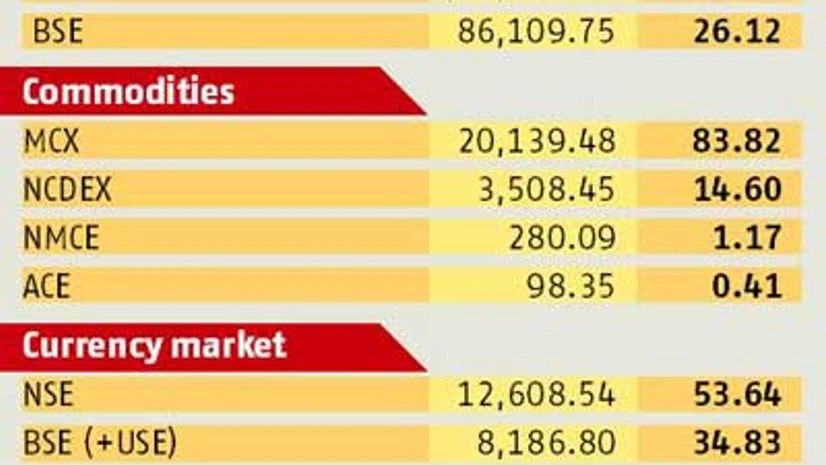The implications of the merger are significant. Stock exchanges will be able to become universal exchanges wherein equities, debt instruments and currencies are traded under the same roof as commodity derivatives. Stock exchanges already have depositories and clearing corporations that will cater to the needs of commodity traders as well.
However, after talking to experts, it is evident that the commodity exchange space will see consolidation and ultimately three or four players will remain on the scene, as compared to six now, including existing large stock exchanges such as the National Stock Exchange (NSE) and Bombay Stock Exchange (BSE),
Multi Commodity Exchange (MCX) and National Commodity and Derivatives Exchange (NCDEX).
Jaitley has proposed repealing the Forward Contract Regulation Act and changes in the Securities and Contract Regulation Act in the Finance Bill. However, to give effect to the merger, even the Sebi Act needs to be amended to allow commodities derivatives as security and also to allow Securities Appellate Tribunal to hear cases related to commodities as well. However, these changes are seen only as procedural hiccups.
Opening avenues
The changes will provide enormous opportunities: investment derivatives such as exchange traded funds for silver and other metals, weather and freight derivatives, and index futures and options trading in commodities. It will offer arbitrage opportunities across segments in an exchange, and make margin money fungible for trading across various asset classes like commodities, currencies and equities. Thus, if BSE or NSE starts commodity derivatives, margin money for equities or currencies will also be available for commodities because the clearing corporation will be the same.
After Jaitley announced the proposed merger in the Budget, Sebi called all commodity exchanges to make presentations. In-house expertise is being built and other organisational changes required are also being made. The merger was discussed at the Sebi board meeting held on March 22 in Delhi.
The exchanges, equity as well as commodity, have initiated deliberations on their future strategies when the two market regulators are merged.
An industry insider says one should not be surprised if NSE acquires NCDEX, in which it holds 15 per cent, or launches metals and energy derivatives on its own platform. NCDEX is predominantly into farm commodities, and has a separate subsidiary for spot trading. Another insider says that BSE, which has Sebi's approval to set up a commodity exchange, need not do that or buy into an existing commodity exchange - it can simply launch a segment for commodity derivatives and save costs.

CEOs of several exchanges do not wish to come on record as the regulators for both the markets are still separate and independent. Spokespersons for NSE, BSE, MCX and NCDEX say that since the proposal is yet to be implemented, they are not in a position to comment.
The question is, will the merger add more depth to the market? Aditya Gandhi, director of Sapient Global Markets (India), says: "It is hoped that with time institutional investors like banks and mutual funds will also be allowed to participate in these markets, which will increase liquidity and, therefore, price discovery, and offer more opportunities for hedgers to execute their transactions."
The government is acquiring power to define certain instruments as derivatives that will allow weather and freight derivatives. Weather derivatives could succeed in India as the vagaries of monsoon weigh heavily on the prospects for major crops. These two types of derivatives were discussed by the government a decade ago, but they were never on its priority list as the FCRA amendment to strengthen FMC never fructified.
"This should provide a full array of instruments for farmers, producers, shippers and consumers to manage their risks and therefore should increase participation and depth of the market," adds Gandhi.
High and low
The merger will give a significant boost to the integrity of the commodities market. FMC was dependent on the government for finances. It was short staffed and technologically constrained to regulate and monitor the markets. A Nielsen report in 2013 suggested that dabba trading (illegal off-exchange derivative trading) in commodities had increased 5-7 times after the commodity transaction tax was introduced in July 2013. Sebi should be able to play an instrumental role in controlling this and to bring back the dabba trading to the exchanges.
The merger should also mean an improvement in the overall efficiency for the market participants, including a reduction in transaction costs. Two CEOs, one of a commodity exchange and the other of a stock exchange, agree that all segments under one exchange will help reduce the compliance costs and will result in better utilisation of margin money.
On the flip side, Gandhi says the proposed merger poses serious challenges for Sebi. "As commodity prices have significant implications for the common man, especially in times of famine or drought, it will need to do justice with the expectations of Dalal Street, but also manage the perception of the impact of derivative trading on the common man," he says. "It will also need to wade into new territory and help commodity exchanges manage warehouses, inspections and standardisation to help strengthen the markets."

)
